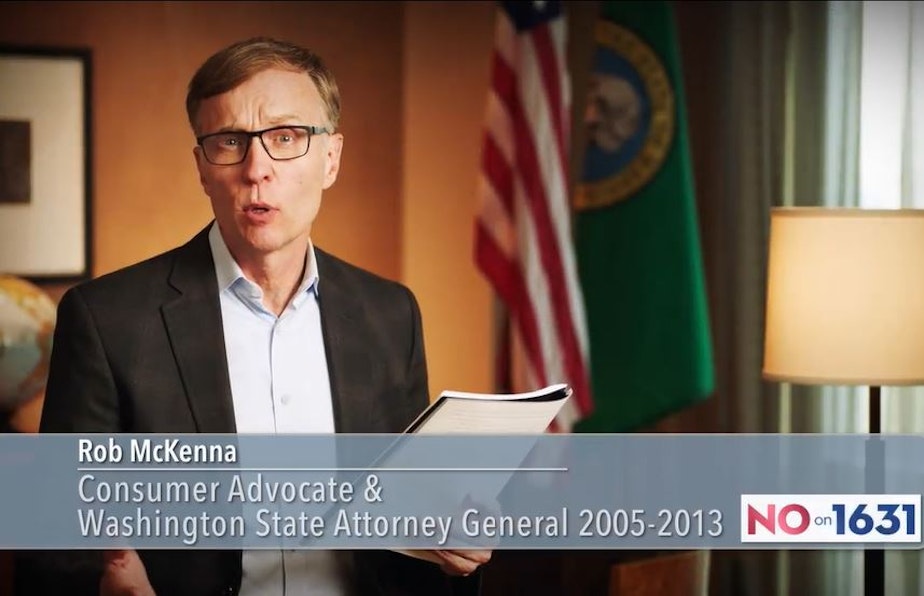Deluge of oil money aims to block Washington carbon fee

The oil industry has pumped more than $28 million into stopping Washington voters from adopting the nation's first fee on carbon pollution.
A gusher of cash from out-of-state oil companies including BP, Phillips 66, Andeavor, Valero and Chevron has made the campaign against the carbon fee initiative the costliest “no” campaign in state history.
The unprecedented sum has also unleashed a deluge of political advertising that critics, including Washington Attorney General Bob Ferguson, say is misleading.
One widely aired anti-carbon fee ad features former Washington attorney general and Republican gubernatorial candidate Rob McKenna.
“As attorney general, consumer protection was my top priority,” McKenna says as the ad begins. "That's why I'm speaking out against I-1631."
The screen labels McKenna as “Consumer Advocate & Washington State Attorney General 2005-2013.” Behind him stand the American and Washington state flags.
Sponsored
The ad does not mention McKenna's employer, the law firm Orrick, Herrington & Sutcliffe, or that his corporate clients now include Chevron, which has given $500,000 to the No on 1631 campaign.
McKenna's LinkedIn profile says, "He represents clients such as Microsoft, T-Mobile, BNSF Railway, and Chevron."

McKenna did not respond to a request for comment Tuesday afternoon.
“A lot of folks think Rob McKenna is me in that ad," current Washington Attorney General Ferguson said at a press conference organized by the Yes on I-1631 campaign. “I get it: two skinny guys with glasses who were our attorney general.But in all seriousness, I'm getting this a lot.”
Sponsored
Ferguson said he and his office are getting multiple phone calls and emails from voters asking why he opposes the carbon fee.
To end the confusion, Ferguson endorsed the carbon fee yesterday. He said it is only the second time in his six years as attorney general that he has endorsed a ballot measure.
“What I see is outside corporate interests from out of state running ad after ad that has the capacity to mislead voters about what's at stake here,” Ferguson said.
I-1631 would impose a $15 a ton fee on most sources of heat-trapping carbon emissions in Washington. The fee, which opponents call a tax, is equivalent to about 14 cents on a gallon of gasoline, would start in 2020 and go up $2 a ton annually.
Revenue would be used to promote clean energy and to help communities adapt to a rapidly changing climate, with a 15-member board appointed by the governor to decide how to spend the money.
Sponsored
Big Oil, Big Bucks
Including a $1.7 million pledge from Andeavor (the oil company formerly known as Tesoro), the No on I-1631 campaign has raised $28.3 million, outpacing grocery manufacturers’ successful, $24.3 million effort to block labeling of genetically modified foods in 2013.
Backers of the carbon fee initiative have raised less than half as much as their foes: $13 million, most of it from sources inside Washington state.
Climate scientists say the world needs to eliminate carbon emissions as fast as possible to avoid disastrous disruption to the climate that humanity and other species rely on.
“The truth is we need to reduce dramatically,” University of Washington atmospheric scientist Cecelia Bitz said. “But the way we start is one step at a time.”
“The cost of not doing anything about these damaging consequences would be much more severe than what we're talking about today with this measure,” Bitz, who studies polar ice, said. “And yet, there are outside groups that are pouring money into our state right now to discourage this campaign and to fight it in blatant disregard of the science and the well-being of our citizens.”
Sponsored
Houston-based BP America, which operates Washington’s largest refinery at Cherry Point, is the No campaign’s biggest donor at $9.8 million. Washington Public Disclosure Commission filings show that BP has also contributed staff time of at least 310 employees to fighting the initiative.
BP spokesperson Michael Abendhoff declined to be interviewed.
“We have for many years supported a well-designed price on carbon, both at the federal and state levels,” Abendhoff said in an email. He said BP opposes I-1631 “because it is a poorly designed policy that would disrupt Washington’s economy without providing significant reductions of carbon emissions.”
“We have an opportunity here to lead the country and start this process of reducing greenhouse gas emissions,” Bitz said.
American Fuel & Petrochemical Manufacturers, the oil industry trade association that counts BP, Chevron and Shell as members, has given $1 million to stop I-1631.
It also donated $250,000 to block Washington Initiative 732, which aimed to impose a carbon tax and lower the state’s sales tax, in 2016.




